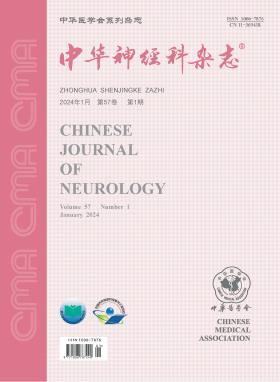The role of cholinergic pathway lesions in vascular cognitive impairment
Q4 Medicine
引用次数: 0
Abstract
Objective To investigate the relationship between white matter lesions (WML) within the cholinergic pathway and vascular cognitive impairment.Method Middle-aged and elderly stroke patients underwent brain MRI examination and Montreal Cognitive Assessment (MoCA).Cholinergic Pathways Hyperintensities Scale (CHIPS) scores and the overall WML burden by Schelten on fluidattenuated inversion recovery MRI images were determined and compared with MoCA scores.Spearman partial rank correlation coefficients and standardized regression coefficients were calculated.Results Thirty four patients were included ( mean age ( 62.2 ± 8.8 ) years, 45-82 years).MoCA scores negatively correlated with WML burdens by Schelten scores ( β = - 0.357, P = 0.042) and CHIPS scores ( β =-0.382,P=0.026).CHIPS scores were negatively associated with visuospatial and executive function (r = - 0.290, P = 0.048 ), naming function ( r = - 0.486, P = 0.002 ), attention ( r = - 0.311, P =0.037) and abstraction ( r = - 0.344, P = 0.023).Schelten scores were negatively associated with naming function (r = - 0.492, P = 0.002), attention ( r = - 0.364, P = 0.017) and abstraction ( r = - 0.390,P=0.011).Conclusion WML lesions within the cholinergic pathyway play a possible role in vascular cognitive impairment especially in visuospatial and executive function. Key words: Cholinergic fibers; Neurol pathways; Brain ischemia; Stroke; Congnitive disorders; Severity of illness index胆碱能通路病变在血管性认知障碍中的作用
目的探讨胆碱能通路白质病变(WML)与血管性认知障碍的关系。方法对中老年脑卒中患者进行脑MRI检查和蒙特利尔认知评估(MoCA)。测定胆碱能通路高强度量表(CHIPS)评分和Schelten在流体衰减反转恢复MRI图像上的总体WML负担,并与MoCA评分进行比较。计算Spearman偏秩相关系数和标准化回归系数。结果纳入34例患者,平均年龄(62.2±8.8)岁,45 ~ 82岁。MoCA评分与WML负担通过Schelten评分(β =- 0.357, P= 0.042)和CHIPS评分(β =-0.382,P=0.026)呈负相关。CHIPS得分与视觉空间和执行功能(r = - 0.290, P = 0.048)、命名功能(r = - 0.486, P = 0.002)、注意力(r = - 0.311, P =0.037)和抽象(r = - 0.344, P = 0.023)呈负相关。Schelten得分与命名功能(r = - 0.492, P= 0.002)、注意力(r = - 0.364, P= 0.017)、抽象性(r = - 0.390,P=0.011)呈负相关。结论胆碱能通路WML病变可能在血管性认知障碍中起重要作用,特别是在视觉空间和执行功能方面。关键词:胆碱能纤维;神经通路;脑缺血;中风;认知障碍;疾病严重程度指数
本文章由计算机程序翻译,如有差异,请以英文原文为准。
求助全文
约1分钟内获得全文
求助全文

 求助内容:
求助内容: 应助结果提醒方式:
应助结果提醒方式:


